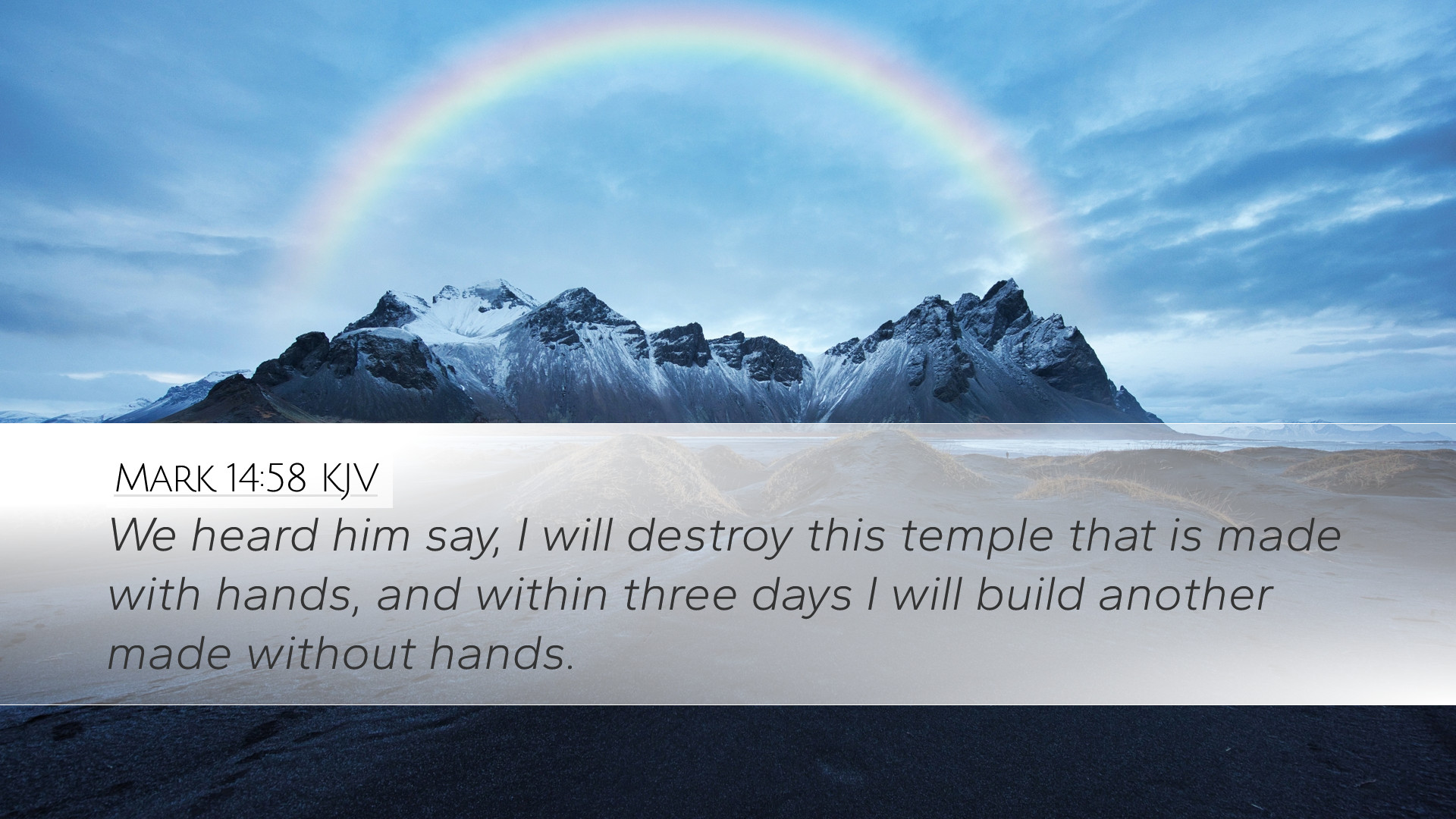Commentary on Mark 14:58
Verse Text: "We heard him say, I will destroy this temple that is made with hands, and within three days I will build another made without hands."
Introduction
Mark 14:58 occupies a critical moment in the Gospel narrative, as it relates to the trial of Jesus before the Sanhedrin. This verse captures the false testimony brought against Him, centering on His proclamation regarding the Temple. Below, we explore the depth of this passage through insights from prominent biblical commentators.
Contextual Background
This verse is situated in the context of Jesus’ impending crucifixion and foreshadows the misunderstanding of His mission. The charges leveled against Him stem from His revolutionary teachings and actions that challenged the religious status quo.
John's Account
It is worth noting that John 2:19 provides a fuller account of Jesus' declaration regarding the Temple. Here, Jesus speaks of His body as the true Temple, in contrast to the physical structure that the Jews held sacred.
Insights from Matthew Henry
Matthew Henry emphasizes the ironic twist in the testimony against Jesus. He notes that the witnesses intentionally misrepresented His words, indicating a willful distortion of truth. Henry reminds us that the statement about the Temple reveals both the misunderstanding of Jesus' mission and the divine truth of His resurrection.
- Misunderstood Words: Henry elaborates on how Jesus' statement about the Temple is twofold: it refers both to the physical structure and His own body, revealing deeper theological implications regarding His role as the Messiah.
- Symbolism of the Temple: The Temple serves as a symbol of God's presence among His people, and Jesus’ claim highlights a shift from the physical to the spiritual.
Insights from Albert Barnes
Albert Barnes provides a detailed exposition on the implications of Jesus' words regarding the Temple. He points out the prophetic nature of this statement, reflecting on Jesus' authority over sacred spaces.
- Destruction and Restoration: Barnes emphasizes that Jesus prophesied the destruction of the Temple, which occurred in 70 A.D., thus validating His prophetic nature.
- Interpretation of 'without hands': The phrase "made without hands" suggests a work of divine origin, underscoring the distinction between the temporal nature of earthly structures and the eternal nature of God's work in Christ.
Insights from Adam Clarke
Adam Clarke delves into the original language and cultural intricacies surrounding the verse. He brings forth the significance of the legal context, where the Jewish leaders sought to solidify their case against Jesus.
- False Witness: Clarke addresses the nature of the allegations, pointing out the importance of providing two or three witnesses according to Mosaic law. Yet, the testimonies lacked substantiation and context.
- Emphasis on Jesus’ Authority: Clarke notes that in claiming to destroy the Temple, Jesus was essentially asserting His authority over it, reinforcing His divine identity.
Theological Implications
The theological implications of Mark 14:58 are profound, as they revolve around the theme of Jesus as the true Temple. The misunderstanding of His words by the witnesses foretells the transition from the Old Covenant established through the Temple to the New Covenant established through Christ.
- God's Presence: Jesus represents the embodiment of God's presence among humanity, as seen in Colossians 2:9, "For in Him dwells all the fullness of the Godhead bodily."
- Redemption and Restoration: This passage foreshadows the redemptive work of Christ, where His death and resurrection lead to the establishment of the Church as the new Temple (1 Peter 2:5).
Conclusion
Mark 14:58 encapsulates a pivotal moment in Jesus' earthly ministry, illustrating how His profound teachings were often met with misunderstanding and opposition. As pastors, students, and scholars, it is essential to delve into these nuances to appreciate the multifaceted nature of Christ's mission. Through false accusations, He ultimately fulfills God's plan of redemption and redefines how humanity perceives the dwelling of God among them.


